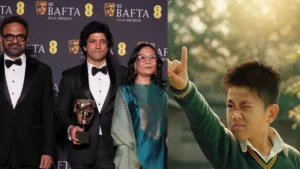The Ministry of Information and Broadcasting confers the prestigious National Film Awards along with cinema’s highest honor, the Dadasaheb Phalke Award each year. The 70th National Film Awards were conferred on 8 October 2024 by Hon. President Draupadi Murmu.
Beginning of Indian Cinema
- The journey began in 1913 with the release of Raja Harishchandra, the first full-length Indian film, directed by Dadasaheb Phalke, who is regarded as the father of Indian cinema.
- Phalke’s dedication to indigenous filmmaking set the foundation for Indian cinema, inspiring future filmmakers to explore the power of films as a medium of storytelling.
Objectives
- The Awards aim at encouraging the production of films of aesthetic & technical excellence and social relevance contributing to the understanding and appreciation of cultures of different regions of the country in cinematic form, thereby also promoting unity and integrity of the nation.
- The awards also aim at encouraging the study and appreciation of cinema as an art form and dissemination of information and critical appreciation of this art form through publication of books, articles, reviews etc.
About National Film Award
Inception
- The National Film Awards were established in 1954 to promote cinematic excellence in India.
- The first edition of the awards was held for films released in 1953 and was initially referred to as the ‘State Awards’.
Initial Awards
- The first awards included two President’s Gold Medals, two certificates of merit, and 12 silver medals for regional films.
- The inaugural event spanned two days, featuring exhibitions and the premiere of two documentaries alongside the awards presentation.
Purpose and Recommendations
- The State Awards were instituted to encourage the production of films with high aesthetic and technical standards that had educational and cultural value.
- The Film Enquiry Committee, established in 1949, recommended the institution of the State Awards and proposed that Regional Awards for feature films should be included in subsequent years.
Regional Awards
- For the first six years, the Regional Best Award was given to the National Best Film, establishing a precedent for recognizing regional cinema.
- Over the years, the number of award categories has expanded to include various technical crafts and artistic achievements.
Introduction of Actor and Actress Awards
- The Best Actor and Best Actress awards were first presented in 1968 to Uttam Kumar and Nargis, respectively.
- Initially, the Best Actress award was called ‘Urvashi’, and the Best Actor award was named ‘Bharat’.
Commemoration of Indian Cinema
- To commemorate the release of Raja Harishchandra, the first Indian feature film released on May 3, 1913, it was decided to present the National Film Awards annually on May 3.
Evolution of Award Categories
- Over the years, various award categories and names have changed to adapt to the evolving landscape of cinema.
- The number of awards has gradually increased to reflect the growing diversity and complexity of the film industry.
Selection Process
Jury Composition
- Each year, after seeking entries for the NFA from the previous year, the Ministry of Information and Broadcasting constitutes juries for Feature Film, Non-Feature Film, and Best Writing in Cinema sections.
- These juries comprise distinguished individuals from the fields of cinema, art, and humanities.
Two-Tier Selection Process
- Since the 57th National Film Awards, the feature film section is decided through a two-tier selection process:
- Five regional panels shortlisted entries, followed by a national panel deciding the winners.
- The Non-Feature Film and Best Writing on Cinema sections have specific juries for selection.
Dadasaheb Phalke Award Selection
- The selection for the Dadasaheb Phalke Award is made by a committee of eminent film personalities specifically constituted for this purpose.
- Notably, no entries are invited for this award.
70th National Film Awards (2022) Ceremony
- The winners of the 70th National Film Awards for the year 2022 were announced by the jury on 16th August 2024.
- The 70th National Film Awards ceremony was held on October 8, 2024, at Vigyan Bhawan, New Delhi, where President Droupadi Murmu presented the awards.
- The event was attended by Union Minister Ashwini Vaishnaw and other distinguished guests.
Key Sections of the Awards
- Feature Film Awards: Recognizing outstanding feature films across various languages and genres.
- Non-Feature Film Awards: Celebrating excellence in short films, documentaries, and animation.
- Best Writing on Cinema: Honoring books and critics that explore and contribute to the discourse on Indian cinema.
- Dadasaheb Phalke Award: Awarded for lifetime contributions to Indian cinema.
Notable Award Winner
- Best Feature Film: Aattam (The Play)
- Best Popular Film Providing Wholesome Entertainment: Kantara
- Best Feature Film Promoting National, Social, and Environmental Values: Kutch Express
- Best Film in AVGC: Brahmastra Part 1: Shiva
- Best Debut Film of a Director: Fouja
- Best Direction: Sooraj Barjatya for Unchai
- Best Actor in a Leading Role: Rishab Shetty for Kantara
- Best Actress in a Leading Role:
- Nithya Menen for Thiruchitrambalam (Tamil)
- Manasi Parekh for Kutch Express (Gujarati)
- Best Actor in a Supporting Role: Pavan Raj Malhotra for Fouja (Haryanvi)
- Best Actress in a Supporting Role: Neena Gupta for Uunchai (Hindi)
- Best Child Artist: Sreepathy for Malikappuram (Malayalam)
- Best Male Playback Singer: Arijit Singh for “Kesariya” from Brahmastra Part 1: Shiva (Hindi) Best Female Playback Singer: Bombay Jayashri for Saudi Vell
- Mithun Chakraborty, who received the prestigious Dadasaheb Phalke Award, while
- AR Rahman won his seventh national award for Ponniyin Selvan I, which also took home the Best Film award.
| Summary/Static | Details |
| Why in the news? | The Ministry of Information and Broadcasting confers the prestigious National Film Awards along with cinema’s highest honor, the Dadasaheb Phalke Award each year. |
| Event Name | 70th National Film Awards |
| Date of Ceremony | October 8, 2024 |
| Conferred By | Hon. President Draupadi Murmu |
| Origin of Indian Cinema | – First Indian full-length film: Raja Harishchandra (1913)
– Directed by Dadasaheb Phalke, the father of Indian cinema. |
| Objectives | – Encourage films of aesthetic & technical excellence
– Promote cultural understanding and national unity – Encourage study and appreciation of cinema. |
| Selection Process | – Jury composed of cinema, art, and humanities professionals
– Two-tier system for Feature Films: regional panels followed by a national panel |
| Dadasaheb Phalke Award Selection | – Selected by a committee of eminent film personalities
– No entries invited for this award |
| 70th National Film Awards (2022) | – Jury announced winners on August 16, 2024
– Ceremony held at Vigyan Bhawan, New Delhi, on October 8, 2024 |
| Key Sections of the Awards | – Feature Film Awards
– Non-Feature Film Awards – Best Writing on Cinema – Dadasaheb Phalke Award |
| Notable Award Winners Category | Name |
| Best Actor in Leading Role | Rishab Shetty for Kantara |
| Best Actress in Leading Role | Nithya Menen for Thiruchitrambalam (Tamil) |
| Best Actress in Leading Role | Manasi Parekh for Kutch Express (Gujarati) |
| Best Actor in Supporting Role | Pavan Raj Malhotra for Fouja (Haryanvi) |
| Best Actress in Supporting Role | Neena Gupta for Uunchai (Hindi) |
| Best Child Artist | Sreepathy for Malikappuram (Malayalam) |
| Best Male Playback Singer | Arijit Singh for Kesariya from Brahmastra Part 1: Shiva (Hindi) |
| Best Female Playback Singer | Bombay Jayashri for Saudi Vell |
| Dadasaheb Phalke Award | Mithun Chakraborty |
| Best Film | Ponniyin Selvan I (Directed by AR Rahman, Best Film Award) |




 ‘Boong’ Puts India on the Map with First...
‘Boong’ Puts India on the Map with First...
 'One Battle After Another' Dominates 202...
'One Battle After Another' Dominates 202...
 List of Dadasaheb Phalke Award Winners f...
List of Dadasaheb Phalke Award Winners f...








